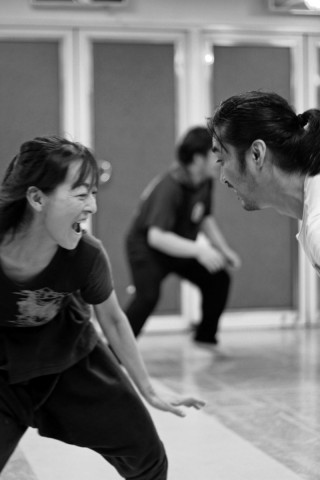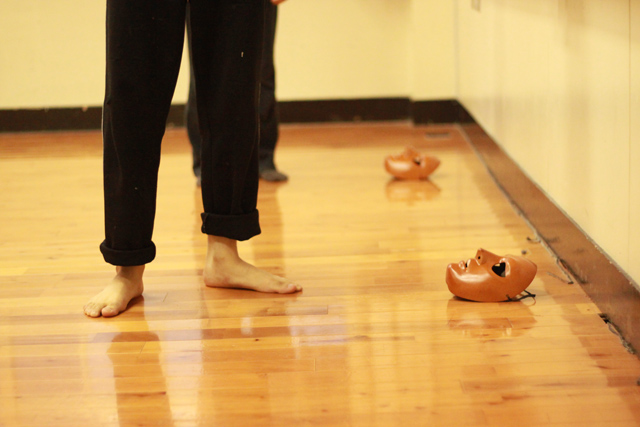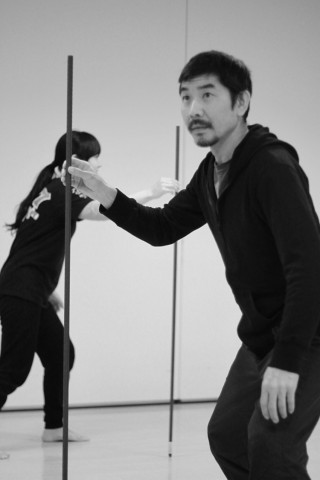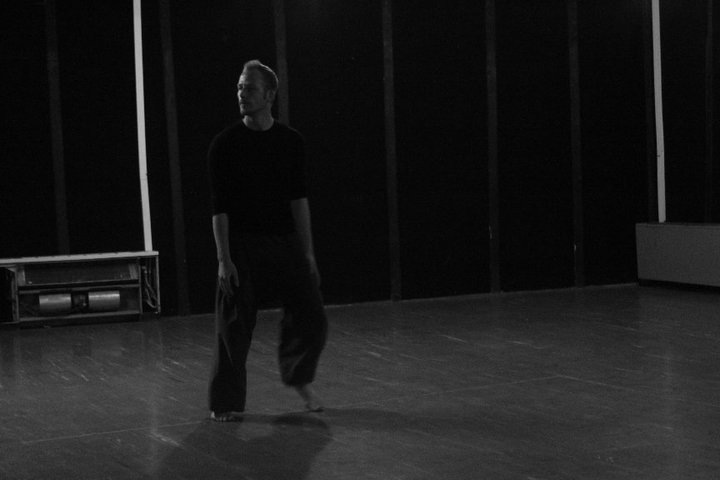Over the past decade, James Sutherland has traveled the world, sharing his passion for exploratory movement, acting and improvisation. Now, as founder and director of CITA, the Center International for Theater Arts, he wants to revitalize Tokyo’s performing arts scene and re-imagine theater’s place in the modern life. He’s just not sure exactly how that will happen.
By Sarah Custen
(Image: Neutral mask training June 2012, Ikebukuro. Photograph by Chie Nakagawa)
Growing up in New Zealand, Sutherland was always fascinated by Asian cultures and immersed himself in various martial art forms. He was also drawn towards acting, eventually earning an M.A. in Theatre Arts/Directing from the New Zealand Drama School. Curious to see how he could fit these two worlds together, Sutherland worked as a stunt man in film and television. But he quickly grew weary of the brutish nature of the stunt world, where men throw themselves around for “danger-money,” without any real appreciation for the movement’s history, grace, or skill.
So at age 25, Sutherland set out for Japan. He spent two years living and working in Tokyo’s Shimokitazawa neighborhood, teaching English by day and studying kabuki on the side. Foregoing an agent-based career path, he left Japan after 2 years for England, where he collaborated to develop a 3-year Honors B.A. program in Physical Theater for the East 15 Acting School. In shaping this degree, he was able to emphasize the importance of autonomy and inspiration within the limits of a defined curriculum. Rather than teaching homogeny and agent dependence, students in the Physical Theater program “have the ability, after 3 years, to make their own work, and at the same time, their curiosity about life and all its phenomena has grown.”

Shakespeare: giving a body to the words workshop, Ikebukuro, Tokyo. September 2012.
Photographer James Sutherland
After five years spent “in practical research,” Sutherland returned to Japan in 2012. This time, his passion for relevant, engaging theater would take center stage. His drive to empower people and make them responsible for their creations, without a pre-determined “aesthetic agenda,” led Sutherland to found ICCA—the International Centre for Creative Arts. ICCA is his response to the “unsatisfactory” state of theaters worldwide, which he sees as either holding tightly to traditions in which they’ve lost confidence (and audience, as established theater-goers age out), or idly wishing to revolutionize theater, without knowing how. ICCA promises to be different, to function as a sort of theatrical laboratory, further research into “the nature of theater,” and how best to keep it alive.
Sutherland has said that the world needs theater now more than ever, yet struggles to confront the lack of support and educational infrastructure. “There’s not a huge amount of performing arts programs in universities in Japan,” he said, “whereas there are around 2000 in Korea, many of them practical.”
What ICCA is offering, then, is “an educational journey, outside of universities” and differing from the traditional, apprenticeship-style training offered by most Japanese theater companies. Within the old paradigm, “you learn the aesthetic of the company, how the company works…so you’re not learning how to create, yourself; you’re learning how to interpret someone else’s creative vision.”
Through ICCA, Sutherland organized his first Japan-based workshops with help from Ichiro Nakayama, formerly of the Suzuki Company of Toga. But it was a big adjustment from teaching an 11-week term in England to a 3-day workshop in Japan. He began by teaching neutral mask, which covers the entire face and forces expression to come from body movement. It wasn’t working. Sutherland quickly saw that this blank-slate approach was met with hesitation. “Failure is a necessary part of learning,” he explained, “and here, people don’t want to take that step. They will wait much longer to be told what to do.”
So he switched to clown technique, another sort of mask, a way of allowing one’s vulnerability to reveal itself. “The Japanese have a fantastic sense of humor,” he said, “They have a real sensibility toward the physicality and towards the emotional charge that kind of ‘playing’ offers people. And we had more fun.”
This ability to tune into what’s happening and change what isn’t working is exactly what Sutherland feels the performing arts community is lacking, and why audiences are losing interest. To confront this apathy, he started CITA, a 5-year project and the performing wing of ICCA. On Facebook, CITA/International Centre for Creative Arts & Creative Learning describes itself as “a central hub through which artists, from around the world, from a variety of disciplines, may come together to collaborate and test work. They do this in the hope of revitalizing the theatre and rediscovering what it is that speaks to people.”
The theater company aims to get away from results-driven theater, commercial theater and high text theater as isolated and esoteric forms. Sutherland sees CITA as “a place where these different energies can converge,” to keep the audience fully engaged, adding, “There’s a difference between pleasing an audience and making sure that they continue to be a part of the collective experience. Different stories require different forms at different times.”
And Sutherland’s different organizations require funding, the lack of which has greatly impacted CITA’s and ICCA’s reach. If his goal is to create and inspire “people who are flexible enough to play with the circumstances they’re given” on stage and in the audience, Sutherland’s challenge has been finding equally open-minded people to support him. It’s not only audiences who are indifferent, but benefactors, too.
However, improvisation and adaptation are Sutherland’s specialties. Teaching in Iran, Korea, New Zealand, and most recently a series of sold-out workshops for the Ibero Americano del Teatro in Columbia, he’s kept constantly on his toes, perpetually vigilant. With CITA’s growth, Sutherland hopes to take the show on the road, adjusting along the way to discover and exploit possible variances. “Each place is a different test,” he said, “because it’s a different group with a different dynamic.”
Right now, the test seems to be: finding definite funding for an undefined outcome. CITA is currently courting various embassies to sponsor an upcoming performance of The Nose, based on Nikolai Gogol’s novella. After that, maybe a Spanish work, then perhaps another try at Shakespeare (they performed Romeo & Juliet last October). CITA’s future, much like its approach, is anything but concrete. For his part, Sutherland remains practical, but optimistic. He is willing to risk failure, to take that step, in the service of something bigger. If it doesn’t work, then he’ll move on. For now, he’s content to just see what happens.
“You need the spontaneity of life,” he said. “Without structure it’s complete chaos…but if you have too much structure, there’s no room for movement.”
To find out more about CITA’s work, check out their Facebook page or contact them at [email protected].










